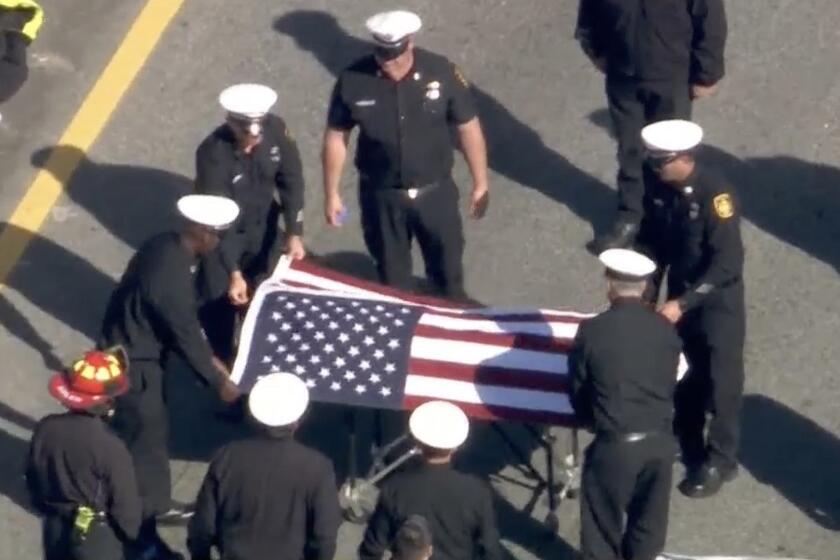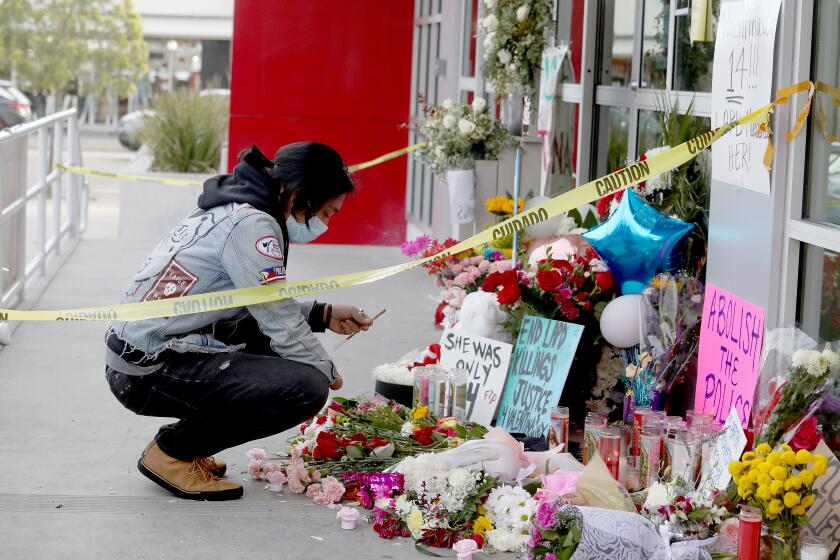Halloween rules to protect children violate sex offenders’ rights, lawyer says
On Halloween night, children dressed as ghosts, goblins and superheroes are free to roam neighborhoods in search of candy and a little holiday-inspired mischief.
As a safety precaution, state authorities have imposed Halloween restrictions on sex offender parolees, barring them from putting up decorations or passing out treats.
And in San Diego County, they are required to post signs outside their homes discouraging trick-or-treaters from approaching.
A lawyer and activist from Santa Maria, Calif., wants to change that. She filed a lawsuit last week in San Diego federal court on behalf of an unidentified Chula Vista man, accusing the state of violating his rights and those of other registered sex offenders.
“For them, Halloween truly is a night of horrors,” said Janice Bellucci, who also is president and founder of California Reform Sex Offender Laws. The organization is “dedicated to protecting the U.S. Constitution by restoring the civil rights of individuals required to register as sex offenders in California,” according to court documents.
Bellucci said many parolees don’t know how officers are going to interpret the special conditions on Halloween night. She said she’s received calls from people with concerns that they might be violating parole if they turn on the porch light for a visiting relative or if they post a pumpkin drawing on the refrigerator created by one of their own children.
“They don’t know truly what is required of them,” Bellucci said.
Officials with the state Department of Corrections and Rehabilitation, the defendant in the lawsuit, said they were unable to comment on specifics of the case.
For more than 20 years, the department has run what it calls Operation Boo, a statewide Halloween night event in which parole officers and other law enforcement conduct compliance checks on known sex offenders. The goal is to make sure that sex offender registrants aren’t attracting children to their homes.
Under California law, offenders convicted of certain types of sex crimes can be required to register with law enforcement officials, notifying them of where they live. Megan’s Law, passed by the Legislature in 2004, gave the public access to that information via the Internet. Previously, such information could be accessed only in person by visiting a police or sheriff’s station.
The Department of Corrections and Rehabilitation reported last year that it was responsible for supervising about 11% of the nearly 92,000 sex offenders in California. Under Operation Boo, the special conditions of parole for sex offender registrants on Oct. 31 are as follows:
- There is a curfew from 5 p.m. to 5 a.m. during which parolees must remain indoors;
- All exterior lights of their homes must be turned off so that it looks as though no one is home;
- No offering of Halloween candy and no Halloween decorations is allowed;
- During the curfew, sex offender parolees may only open the door to respond to law enforcement.
Operation Boo does not require that offenders affix a poster to their homes as a warning to potential visitors, said Luis Patiño, a spokesman for the department.
But Bellucci said she learned from her client, the plaintiff identified in the lawsuit only as John Doe, that there is such a requirement in San Diego County. She said she confirmed that information with her client’s parole officer and that she also has it in writing.
In 2013, when the Union-Tribune went with parole officers on an Operation Boo sweep in San Diego, the signs were seen at at least two locations, in National City and Chula Vista. One read, “Not participating in Halloween activities. No trick or treaters,” and another read, in part, “Sorry, no candy.”
According to the lawsuit, requiring parolees to post signs on their front doors encourages speech in violation of their 1st Amendment rights. It also invites harm to themselves, the people they live with and their property by forcing parolees to “advertise” their status as registered sex offenders.
Bellucci contends in the suit that state authorities enforce the Halloween policy in an “arbitrary and unreasonable manner,” taking no account of the age of a sex offender’s conviction or whether it involved a crime against a child.
The unnamed plaintiff in the lawsuit was required to register as a sex offender because of an offense that occurred before 1985 and did not involve a child. Since then, he has not committed another sex offense, and is currently on parole because of a drug-related conviction, according to court documents.
Bellucci has filed similar lawsuits against the cities of Simi Valley and Orange over Halloween restrictions on registered sex offenders — “registered citizens,” as she prefers to call them — including mandatory sign requirements. She said officials repealed the laws and the suits were dismissed.
Last year, parole agents arrested 62 of the 1,294 sex offender parolees who were contacted during Halloween night compliance sweeps throughout the state. The arrests were on charges of possession of child pornography, narcotics, weapons and other parole violations, state authorities said.
dana.littlefield@sduniontribune.com
Dana Littlefield writes for the San Diego Union-Tribune.
More to Read
Start your day right
Sign up for Essential California for news, features and recommendations from the L.A. Times and beyond in your inbox six days a week.
You may occasionally receive promotional content from the Los Angeles Times.






